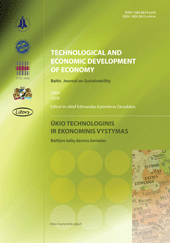Regional Development in Lithuania Considering Multiple Objectives by the MOORA Method
Regional Development in Lithuania Considering Multiple Objectives by the MOORA Method
Author(s): Romualdas Ginevičius, Willem Karel M. Brauers, Valentinas PodvezkoSubject(s): Economy
Published by: Vilnius Gediminas Technical University
Keywords: MOORA (Multiple Objectives Optimization by Ratio Analysis); ratio system; Reference Point Theory; regional development; redistribution of income; labor drain
Summary/Abstract: The inequality between the regional incomes in a nation with a developed fiscal and para-fiscal regime including social security will be equilibrated automatically by transfer payments from the richer to the poorer regions. The automatic system is not a guaranty for success. Internationally a project oriented system of the international organizations is known instead of an automatic system but the final goal is not always very clear. Multiple Objectives Optimization looks more robust to obtain regional and international development. Moreover a system of transfer payments is not sufficient to measure the well being of a regional population. In the well-being economy, each individual would have to feel good concerning material wealth, health, education, all kind of security and concerning the environment. With other words, multiple objectives have to be fulfilled. However, these different multiple objectives are expressed in different units. Weights are most of the time used to equalize these different units. Introduction of weights means introduction of subjectivity. In order to avoid this dilemma, the internal mechanical solution of a ratio system, producing dimensionless numbers, is preferred: MOORA. In addition, this outcome creates the opportunity to use an additional non-subjective reference point theory. The choice and importance of the objectives is also non-subjective if all stakeholders involved come to an agreement. This theory is applied on the different counties of Lithuania. At that moment it is no more only a question of redistribution of income but also of a national policy of new constructions, of tourism development, of pollution abatement and of energy renewables, after the European Commission “related to the promotion of local employment”.
Journal: Technological and Economic Development of Economy
- Issue Year: 2010
- Issue No: 4
- Page Range: 613-640
- Page Count: 28
- Language: English

